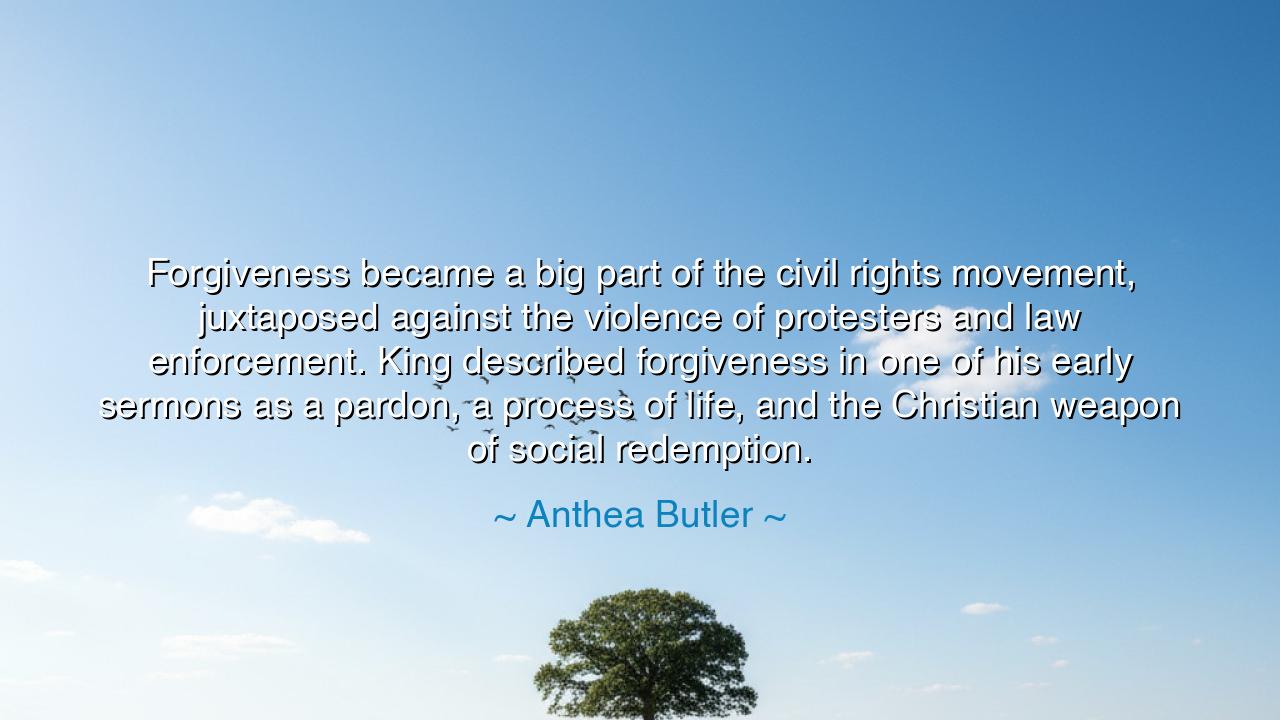
Forgiveness became a big part of the civil rights movement
Forgiveness became a big part of the civil rights movement, juxtaposed against the violence of protesters and law enforcement. King described forgiveness in one of his early sermons as a pardon, a process of life, and the Christian weapon of social redemption.






Host: The room was still, the evening light softening as the day faded into night. Jack sat near the window, his fingers absentmindedly tapping the edge of his coffee mug, his thoughts clearly distant. Jeeny, across from him, sat in her chair, her legs tucked beneath her, her gaze lost in thought. The quiet between them felt comfortable, yet there was a subtle tension, as though something important was about to be shared.
Host: Anthea Butler’s words filled the air: “Forgiveness became a big part of the civil rights movement, juxtaposed against the violence of protesters and law enforcement. King described forgiveness in one of his early sermons as a pardon, a process of life, and the Christian weapon of social redemption.” The simplicity of the statement, paired with its historical weight, seemed to open up a deeper conversation about forgiveness, justice, and redemption. Jack, who often analyzed the practical aspects of social change, was the first to respond.
Jack: His voice was reflective, almost somber: “It’s powerful, isn’t it? That idea of forgiveness being a weapon for social redemption. In the face of so much violence and hatred, Dr. King didn’t just preach about fighting back physically, he preached about the power of forgiveness. In a time when the civil rights movement was pushing for justice, King was showing that true change didn’t come from retaliation, but from transforming the cycle of violence with something deeper—forgiveness.”
Jeeny: She nodded, her voice gentle, but filled with understanding: “Exactly. King’s message wasn’t just about challenging the systems of injustice—it was about changing the hearts of people, even those who were opposing the movement. Forgiveness wasn’t about excusing the wrongs that were being committed; it was about breaking the cycle of hatred and violence. It was about using love and understanding as a tool for transformation, both for the individual and for society as a whole.”
Host: The weight of her words seemed to resonate between them, the idea that forgiveness could be a force for change in such a turbulent time. It wasn’t just about personal healing—it was about social healing, about how forgiveness could be the key to overcoming the deep divides in society. Jack, usually focused on more practical solutions, seemed to soften as he reflected on how forgiveness had played such a pivotal role in the civil rights movement.
Jack: His voice was softer, almost revelatory, as he continued: “Maybe that’s what makes forgiveness so powerful in social movements. It’s not just about moving forward in a personal way, it’s about breaking down the walls that separate us. If you keep responding to violence with more violence, the cycle never ends. But if you can respond with understanding, with forgiveness, you create space for change—real change.”
Jeeny: Her expression deepened, her voice reassuring and filled with quiet strength: “Exactly. It’s not about ignoring the injustice, but about choosing a response that transcends the immediate conflict. Forgiveness doesn’t mean we accept wrongs; it means we choose a different path, one that can heal wounds instead of just deepening them. It’s a radical act of resistance, really. It’s saying, ‘I won’t let hate or violence define me, and I won’t let it define my community.’”
Host: The room grew a little quieter, as though the weight of their conversation was settling into something profound. The idea that forgiveness—often seen as a personal, inward act—could also be a tool for social justice was both humbling and empowering. Jack and Jeeny sat together, realizing that the act of forgiving in the face of violence wasn’t just an act of peace; it was a weapon, a means to disrupt cycles of oppression and hatred and open the door to real change.
Jack: His voice, now gentler, seemed to carry the weight of the realization: “Maybe that’s the power of forgiveness—it’s not just for the person you forgive. It’s for everyone around you, for society as a whole. By choosing to forgive, you’re not just letting go of resentment, you’re creating space for transformation—on a personal and social level.”
Jeeny: She smiled softly, her voice filled with peace: “Exactly. Forgiveness isn’t about being weak or passive. It’s about strength—the strength to choose a different path, one that leads to healing and progress. And when we choose to forgive, we’re taking part in something much bigger than ourselves. We’re actively transforming the world around us.”
Host: The evening continued, but the world outside felt distant. Inside, Jack and Jeeny sat in the quiet understanding that forgiveness wasn’t just about personal growth—it was a force for change, a means to break down barriers and create space for a more just and compassionate world. The conversation left them with the realization that, like Dr. King’s teachings, forgiveness could be one of the most radical and powerful tools in the fight for true justice and social redemption.






AAdministratorAdministrator
Welcome, honored guests. Please leave a comment, we will respond soon